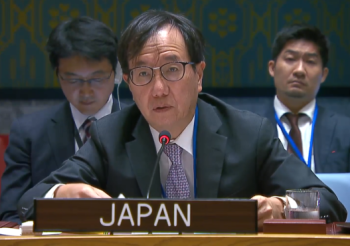Statement by H.E. Ambassador YAMAZAKI Kazuyuki, Permanent Representative of Japan to the United Nations, at the Security Council Briefing on Somalia
2024/6/24

I thank Acting SRSG James Swan and SRCC El-Amine Souef for their informative briefings. I also would like to welcome the presence of the representative of Somalia and congratulate on its successful election to a non-permanent member of the Security Council with the term of 2025 to 2026. We look forward to Somalia’s contribution to the Council.
Let me extend a warm welcome back to Acting SRSG Swan. Your vast knowledge and expertise will be a great asset for UN efforts in Somalia, which are in the middle of a critical transition. Japan continues to work closely with you.
Mr. President,
The third phase of the ATMIS drawdown is getting closer to the end. We pay tribute to all the personnel of ATMIS and the Somali Security Forces for their sacrifice to build peace in the region.
The strong commitment of the Federal Government of Somalia (FGS) to its security transition plan is commendable, and we respect its strong will and support its ongoing efforts.
The Joint Technical Assessment report on the lessons learned from the ATMIS drawdown Phase 1 and 2 indicated heightened challenges in handovers of remote ATMIS forward bases and an insufficiency of Somali force generation. Sufficient deployment of Somali security forces must keep pace with the ongoing ATMIS drawdown in order to mitigate any negative impacts on local communities. As offensive operations against Al-Shabaab advance into its remaining strongholds, security sector reform should be further accelerated. In order to support the effort of the FGS, Japan has been supporting the capacity development of Somali Police in newly recovered areas.
The support from the neighboring ATMIS Troop Contributing Countries is playing a vital role in the Somali security transition. Any regional tensions risk further complicating the already difficult path towards stability and must be addressed through constructive dialogues in accordance with the principles of the UN Charter.
We note the proposal from the FGS and the ongoing discussions in the AU on the post-ATMIS security configuration with an AU-led mission which is expected to be limited in size, scope and timeframe.
The mandate of such mission should be duly prioritized and needs to be implemented in a steadfast manner. We welcome the region-led deliberation on securing peace and stability in Somalia and the security council needs to engage constructively with the regional efforts by examining every possible option.
Mr. President,
Somali society, especially in areas newly liberated from Al-Shabaab, needs to develop resilience to counter any influence by negative forces. This requires a whole-of-society approach based on the Humanitarian-Development-Peace nexus. UNSOM has been serving as a vehicle to complement related national efforts for a long time through various support activities including those that advance the WPS and YPS agendas.
Now, in responding to the request from the FGS, we must deliberate on how best we can achieve a successful and orderly transition from UNSOM to the UN Country Team. To this end, the joint technical team of the Secretariat and the FGS must build a common understanding on the impacts the transition will have on ongoing Somali state-building efforts. Building upon that, the team should determine the appropriate modalities and timeframe for the transition. We cannot lose the hard-won gains in that transition process.
Japan remains committed to contribute together with all our partners to the collective endeavor of advancing sustainable peace and stability in Somalia and the region.
I thank you.
